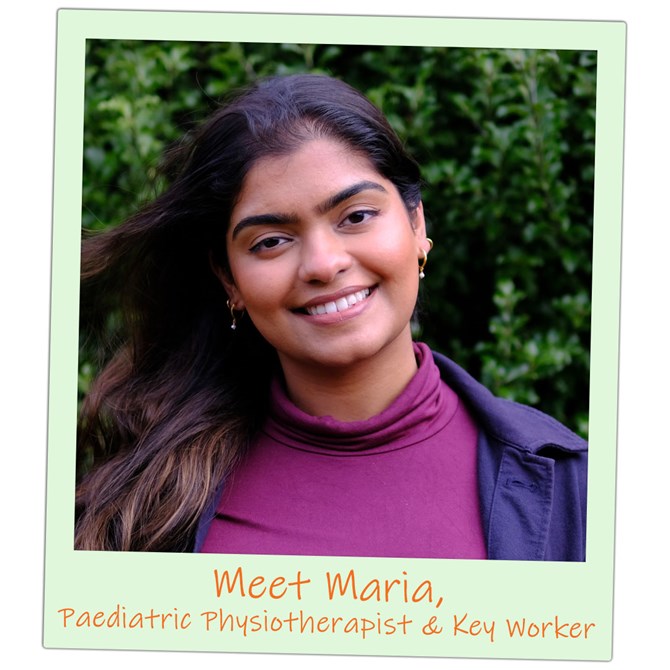 “I am passionate about ensuring a strong support system for every child and find it rewarding to be part of that support system.”
“I am passionate about ensuring a strong support system for every child and find it rewarding to be part of that support system.”A graduate of Physiotherapy from Monash University, Maria joined Windermere earlier this year bringing with her specialist skills gained over four years of work experience. Having worked with both children and adults across not for profit and private organisations, Maria was drawn to Windermere’s role in Early Intervention Therapy Services (EITS).
“Windermere was offering a fulltime paediatric caseload. By then, I had realised that I want to work with children as there is so much potential for improvement. With adults it’s more about managing a given condition,” she says.
The opportunity to work with children wasn’t the only motivation. Maria was also drawn to Windermere’s supportive environment and the many employee benefits.
As Maria put her skills to use, she discovered Windermere’s key worker role to be a transformative approach. “The keyworker role takes a holistic approach to early intervention. I need to know communication strategies, managing behaviour and other areas as well as physiotherapy,” she explains. This was in contrast to her past experience where she had worked within the bounds of Physiotherapy as part of a multidisciplinary team.
To meet the demands of the key worker role, Maria discovered that there is a wealth of opportunities to ask questions and draw on expertise. Shadowing senior team members, fortnightly supervision and regular consultations with occupational and speech therapists facilitate the ability to function as a key worker. These opportunities form the basis of the model where learning through others in the team is encouraged and viewed as best practice. “All the avenues of support take the pressure off having to know everything,” says Maria.
This welcoming environment that facilitates learning extends beyond the EITS team. “I haven’t met anyone who wasn’t approachable at Windermere, and I have felt comfortable asking questions from day one,” she adds.
This learning focused environment means Maria is also able to impart her own expertise in aquatic physiotherapy and assistive technology prescription. Conducting joint hydrotherapy for new graduates and inviting them to watch a trial with new equipment are ways in which she shares her knowledge.
Being out in community also means that team members often work in isolation. Maria observed that it would serve the team well to have opportunities to connect and interact. “What I’m also grateful for is how Windermere is open to new ideas. They took it on board when I proposed that we have a social committee to organise get-togethers like lunches to help the team stay connected.”
While the key worker model enhances the capacity of early intervention therapists, its primary goal is to support families better. “Logistically it’s much easier for families who have so much going on especially with a child with special needs. The key worker model simplifies that as they no longer have to organise several appointments with different therapists.”
This also means a family’s attention is focused on one individual giving rise to another benefit that Maria values highly; the ability to establish ongoing relationships with the families. A sound relationship makes parents feel comfortable enough to have conversations around their own mental health and share if they are struggling. This contrasted with Maria’s past roles where she wasn’t quite able to establish close relationships.
“I don’t think I would ever go back to a multidisciplinary team. I am passionate about ensuring a strong support system for every child and find it rewarding to be part of that support system,” she says. Maria also relishes the challenge involved in engaging with children as it calls on her creativity to come up with strategies and interventions through play.
Her passion and commitment have not gone unnoticed. Families often offer positive feedback on her efforts and one parent acknowledged her with the words, “you actually do what you say”— feedback that Maria cherishes deeply.
With an arsenal of clinical skills Maria is keen to expand her scope. “There are many opportunities for leadership at Windermere. Once I expressed my desire to develop further, I’ve been given small projects to lead, encouraged to speak up, and given guidance and direction to develop those skills,” she says of her experience at Windermere.
Well on her way in her career at Windermere, Maria has some insights for anyone setting their sights on a career in EITS. “Always be open to trying something new or different,” she says reflecting on her early days.
When she was starting out, Maria was unaware of community roles and the high demand for community physiotherapists in the early intervention space. That’s until she saw the job descriptions. “Talk to relevant people to learn about the industry and take the leap even though it can be a little scary. Windermere has a very supportive environment for new graduates. From what I’ve observed the Allied Health Graduate Program sets you up well,” she adds.
Outside of improving the lives of young children and nurturing her career, Maria spends her time on an eclectic mix of activities. Apart from recreational pursuits such as eating out, venturing out for hikes and working out at the gym, Maria loves singing and is a member of the church choir.
To find out more about our Early Intervention and Therapy Services, call the team on 1300 946 337 or email info@windermere.org.au.